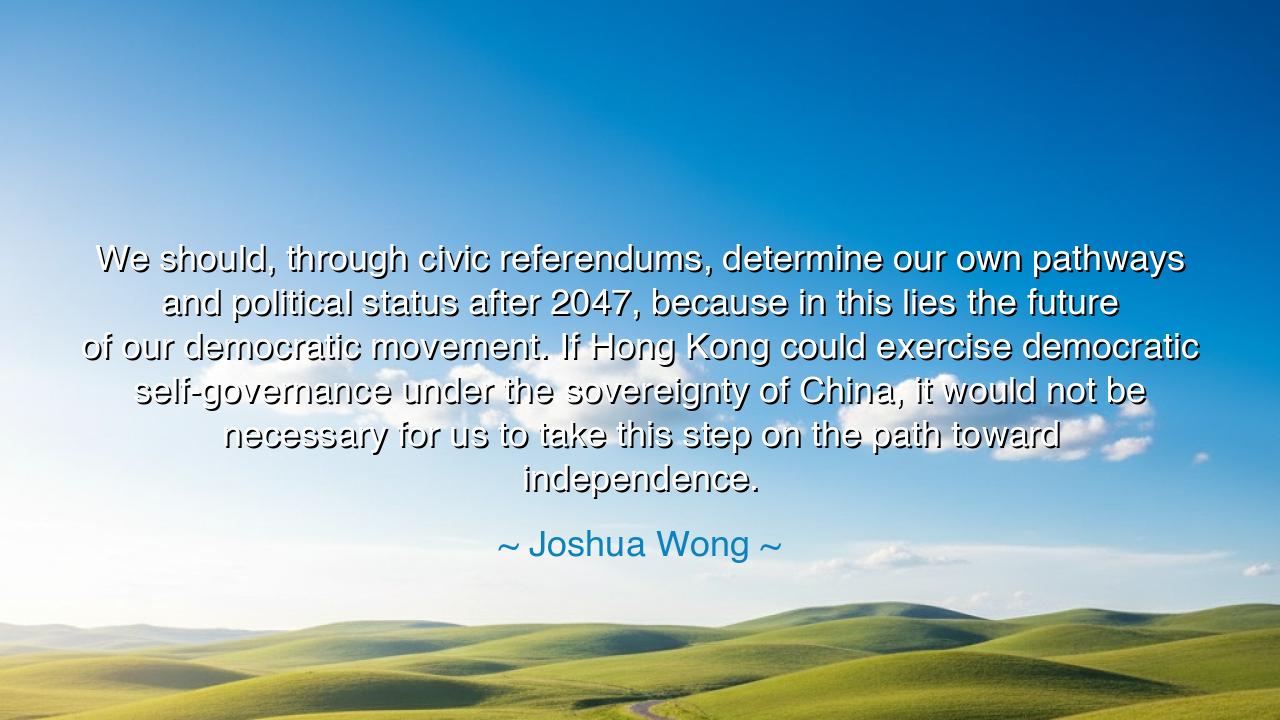
We should, through civic referendums, determine our own pathways
We should, through civic referendums, determine our own pathways and political status after 2047, because in this lies the future of our democratic movement. If Hong Kong could exercise democratic self-governance under the sovereignty of China, it would not be necessary for us to take this step on the path toward independence.






The young leader Joshua Wong, born in a city of glass towers and restless hearts, once spoke with the voice of both courage and sorrow: “We should, through civic referendums, determine our own pathways and political status after 2047, because in this lies the future of our democratic movement. If Hong Kong could exercise democratic self-governance under the sovereignty of China, it would not be necessary for us to take this step on the path toward independence.” In these words lies the cry of a generation caught between empire and identity, between history and hope. It is a call not merely for political freedom, but for self-determination — the right of a people to decide their own destiny.
At its heart, Wong’s declaration is both a plea and a prophecy. It acknowledges a paradox that has echoed through the ages: that freedom is not given — it must be claimed. The people of Hong Kong, long promised autonomy under the principle of “One Country, Two Systems”, have seen their space for dissent narrow, their liberties tested, and their future clouded in uncertainty. Wong’s words point to the year 2047, when the city’s special status is set to expire — a date that hangs over Hong Kong like a shadow on the horizon. In calling for civic referendums, he invokes one of democracy’s oldest and most sacred instruments: the voice of the people, expressed not through violence, but through the ballot.
The origin of such an idea reaches far back into the chronicles of human civilization. From the Athenian agora, where free citizens gathered to shape their city’s destiny, to the American Declaration of Independence, born from the belief that all men are endowed with the right to self-rule, the principle remains the same: that no authority is truly just unless it springs from the consent of the governed. Wong’s vision stands in this same lineage — a modern echo of an ancient truth. His words remind us that democracy is not a mere system of governance, but a covenant between a people and their conscience.
Consider the story of India’s independence — a nation long bound by imperial rule, yet freed not by armies but by the relentless moral will of its people. Mahatma Gandhi, through peaceful resistance and the unshakable belief in self-rule, taught that sovereignty begins in the soul. Like Wong, Gandhi did not seek separation for its own sake; he sought dignity — the ability for a people to decide their fate without subjugation. And when that dignity was denied, independence became not an act of defiance, but an act of necessity. So too does Wong’s statement carry this spirit: if democratic self-governance can coexist with sovereignty, then independence is not rebellion — it is simply the last refuge of justice.
In Wong’s vision, there is neither hatred nor haste. His words are measured, born of reason rather than rage. He speaks not of destruction, but of preservation — of safeguarding Hong Kong’s identity, its freedoms, and its rule of law. To “determine our own pathways,” he says, is not to abandon the past, but to claim ownership of the future. His belief that self-governance under sovereignty could coexist shows the wisdom of one who understands that peace is forged not through division, but through fairness. Yet, his warning is clear: when autonomy is stripped away, when dialogue is silenced, then the human spirit will, inevitably, seek the light of independence.
This struggle between freedom and control, between voice and silence, is not unique to one city or one age. It has lived in the hearts of all peoples who have ever yearned for dignity. The Czechs in Prague, the Poles in Warsaw, the South Africans under apartheid — all have faced the same choice: whether to accept quiet submission or to risk everything for liberty. Each generation must answer this question for itself. And though the forms of tyranny change — sometimes cloaked in law, sometimes hidden behind prosperity — the answer remains the same: the right to choose one’s path is sacred, and those who defend it are the keepers of humanity’s flame.
Thus, the lesson of Joshua Wong’s words is one of moral courage. Freedom is not born in comfort but in struggle; democracy is not sustained by promises, but by participation. To those who listen, his call is not only political but personal: wherever you stand, defend your right to decide, to speak, to shape your destiny. And when systems grow deaf to the will of the people, remember that the power to renew them still lies within the people themselves.
For in the end, independence is not the breaking of chains — it is the refusal to forget who we are. The true strength of any society lies not in its rulers but in the hearts of its citizens, who demand to be heard with dignity and peace. Let every generation, whether in Hong Kong or beyond, learn from Wong’s vision: that to govern oneself is not merely a political act, but a sacred expression of the human soul — the eternal quest to stand upright, free, and unafraid beneath the open sky.






AAdministratorAdministrator
Welcome, honored guests. Please leave a comment, we will respond soon